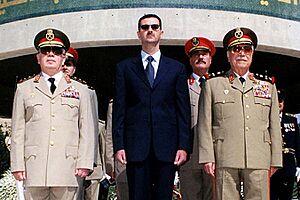Hasan Turkmani facts for kids
Quick facts for kids
Hasan Turkmani
|
|
|---|---|
|
حسن توركماني
|
|

Bashar al-Assad (centre) alongside Syrian Defense Minister General Mustafa Tlass (right) and Military Chief of Staff Hasan Turkmani (left).
|
|
| Deputy Vice President for Military Affairs | |
| In office 3 June 2009 – 18 July 2012 |
|
| President | Bashar al-Assad |
| Prime Minister | Muhammad Naji al-Otari Adel Safar Riyad Farid Hijab |
| 13th Minister of Defense | |
| In office 12 May 2004 – 3 June 2009 |
|
| Preceded by | Mustafa Tlass |
| Succeeded by | Ali Habib Mahmud |
| 18th Chief of Staff of the Syrian Army | |
| In office 23 January 2002 – 12 May 2004 |
|
| Preceded by | Ali Aslan |
| Succeeded by | Ali Habib Mahmud |
| Member of the Regional Command of the Syrian Regional Branch | |
| In office 9 June 2005 – 18 July 2012 |
|
| Personal details | |
| Born | 1 January 1935 Aleppo, French Mandate of Syria |
| Died | 18 July 2012 (aged 77) Damascus, Syria |
| Political party | Ba'ath Party |
| Military service | |
| Allegiance | |
| Branch/service | Syrian Armed Forces |
| Rank | |
| Battles/wars | Yom Kippur War Syrian Civil War |
Hasan Ali Turkmani (Arabic: حسن توركماني; 27 January 1935 – 18 July 2012) was an important military leader and politician in Syria. He was a member of the Ba'ath Party. From 2004 to 2009, he served as the Minister of Defense for Syria.
On 18 July 2012, Hasan Turkmani and three other high-ranking Syrian government officials were killed. This happened during a bomb attack in Damascus.
Contents
Early Life and Education
Hasan Turkmani was born in Aleppo, Syria, in 1935. His family was Sunni Muslim and of Turkmen background. He received a strong military education.
- He graduated from the Military Academy of Homs in 1955. He earned a bachelor's degree in military sciences.
- He continued his studies with advanced courses in military command.
- In 1969, he earned a master's degree in military sciences.
- He completed his highest military education in 1972, earning a doctorate in military sciences.
Military and Political Career
Turkmani began his military career in 1955 as an infantry officer in the Syrian Arab Army. He was among the first officers trained on new armored vehicles like the BMP-1. He also took advanced training courses in East Germany and Egypt.
In 1973, he led the 9th Mechanized Infantry Division. This division played a key role in defending Damascus during a conflict. He was promoted to major general in 1975.
Turkmani became a member of the central committee of the Ba'ath Party in 2000. He served as the deputy chief of staff for the Syrian army until 2002. On 23 January 2002, he became the chief of staff. This appointment was seen as a way to bring more diversity to Syria's military leadership.
On 12 May 2004, Turkmani was appointed Minister of Defense. He took over from Mustafa Tlass. His previous role as chief of staff was then filled by Ali Habib Mahmoud. In 2006, Turkmani visited Tehran, Iran. There, he signed an agreement with Iran to form a joint defense committee.
In June 2009, Turkmani was replaced as defense minister by Ali Habib Mahmud. President Bashar Assad then appointed Turkmani as an assistant vice president. He also became the chief of crisis operations. In this role, he was responsible for managing major national events. He also served as a military advisor to Vice President Farouk Sharaa.
Reports of His Death
On 19 May 2012, there were rumors that Hasan Turkmani had died. A group called the Free Syrian Army claimed to have poisoned several top military officials. They believed Turkmani was among those killed.
However, Turkmani, along with the interior minister at the time, denied these reports. They appeared on State TV to say that the rumors were "categorically baseless."
Assassination and Funeral
Hasan Turkmani was assassinated on 18 July 2012. He was attending a meeting of the Central Crisis Management Cell in Damascus. This meeting was held at the national security building. Opposition militants carried out a bombing attack on the building.
Other high-ranking officials, including Defense Minister Dawoud Rajiha and his deputy Assef Shawkat, were also killed in the attack. Turkmani died from his injuries after the bombing. Many civilians were also hurt. A state funeral was held for him and the other officials on 20 July 2012 in Damascus.
Personal Life
Hasan Turkmani's son, Muhammad Bilal, owned a weekly political magazine. The magazine was called Abyad wa Aswad, which means "Black and White" in English.
 | Janet Taylor Pickett |
 | Synthia Saint James |
 | Howardena Pindell |
 | Faith Ringgold |

